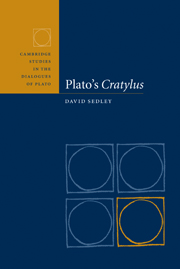Chapter 2 - Plato the etymologist
Published online by Cambridge University Press: 22 September 2009
Summary
ETYMOLOGY IN THE PHILEBUS
I want to start this chapter from somewhere unexpected – not Plato's Cratylus, but his late dialogue the Philebus. In the opening part of this dialogue, Socrates recommends a method which he calls ‘a gift to mankind from the gods’, maybe transmitted, along with fire, ‘through some Prometheus’, to our forebears, who were themselves superior to us and lived closer to the gods (16c5–8). The Prometheus in question has long been suspected of being Pythagoras, and at all events the method, as sketched by Socrates, is likely to be of Pythagorean inspiration. But the allusion to the mythical figure Prometheus, especially as portrayed by Aeschylus in Prometheus Bound, remains direct and significant. For Aeschylus' and Plato's Prometheus have it in common that they both passed to mankind, along with the gift of fire, all of the arts, prominently including the understanding of number.
The gift transmitted by Plato's Prometheus is based on number in the following way: between the single genus from which a scientific investigation might start, and its infinite range of individual members, the true scientist will be concerned above all with systematic enumeration of the intervening kinds or species. Asked for an explanation, Socrates illustrates the method with three examples, all concerned with the classification of sounds. The first, literacy, need not detain us now, but the second, musical expertise, deserves close attention (17c11–e6).
- Type
- Chapter
- Information
- Plato's Cratylus , pp. 25 - 50Publisher: Cambridge University PressPrint publication year: 2003



